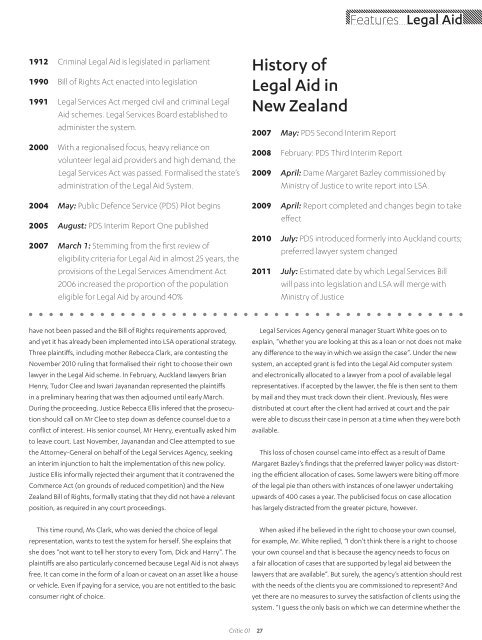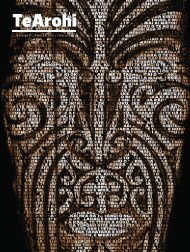BOY - Critic
BOY - Critic
BOY - Critic
Create successful ePaper yourself
Turn your PDF publications into a flip-book with our unique Google optimized e-Paper software.
1912 Criminal Legal Aid is legislated in parliament<br />
1990 Bill of Rights Act enacted into legislation<br />
1991 Legal Services Act merged civil and criminal Legal<br />
Aid schemes. Legal Services Board established to<br />
administer the system.<br />
2000 With a regionalised focus, heavy reliance on<br />
volunteer legal aid providers and high demand, the<br />
Legal Services Act was passed. Formalised the state’s<br />
administration of the Legal Aid System.<br />
2004 May: Public Defence Service (PDS) Pilot begins<br />
2005 August: PDS Interim Report One published<br />
2007 March 1: Stemming from the first review of<br />
eligibility criteria for Legal Aid in almost 25 years, the<br />
provisions of the Legal Services Amendment Act<br />
2006 increased the proportion of the population<br />
eligible for Legal Aid by around 40%<br />
have not been passed and the Bill of Rights requirements approved,<br />
and yet it has already been implemented into LSA operational strategy.<br />
Three plaintiffs, including mother Rebecca Clark, are contesting the<br />
November 2010 ruling that formalised their right to choose their own<br />
lawyer in the Legal Aid scheme. In February, Auckland lawyers Brian<br />
Henry, Tudor Clee and Iswari Jayanandan represented the plaintiffs<br />
in a preliminary hearing that was then adjourned until early March.<br />
During the proceeding, Justice Rebecca Ellis infered that the prosecution<br />
should call on Mr Clee to step down as defence counsel due to a<br />
conflict of interest. His senior counsel, Mr Henry, eventually asked him<br />
to leave court. Last November, Jayanandan and Clee attempted to sue<br />
the Attorney-General on behalf of the Legal Services Agency, seeking<br />
an interim injunction to halt the implementation of this new policy.<br />
Justice Ellis informally rejected their argument that it contravened the<br />
Commerce Act (on grounds of reduced competition) and the New<br />
Zealand Bill of Rights, formally stating that they did not have a relevant<br />
position, as required in any court proceedings.<br />
This time round, Ms Clark, who was denied the choice of legal<br />
representation, wants to test the system for herself. She explains that<br />
she does “not want to tell her story to every Tom, Dick and Harry”. The<br />
plaintiffs are also particularly concerned because Legal Aid is not always<br />
free. It can come in the form of a loan or caveat on an asset like a house<br />
or vehicle. Even if paying for a service, you are not entitled to the basic<br />
consumer right of choice.<br />
<strong>Critic</strong> 01 27<br />
History of<br />
Legal Aid in<br />
New Zealand<br />
2007 May: PDS Second Interim Report<br />
2008 February: PDS Third Interim Report<br />
Features Legal Aid<br />
2009 April: Dame Margaret Bazley commissioned by<br />
Ministry of Justice to write report into LSA.<br />
2009 April: Report completed and changes begin to take<br />
effect<br />
2010 July: PDS introduced formerly into Auckland courts;<br />
preferred lawyer system changed<br />
2011 July: Estimated date by which Legal Services Bill<br />
will pass into legislation and LSA will merge with<br />
Ministry of Justice<br />
Legal Services Agency general manager Stuart White goes on to<br />
explain, “whether you are looking at this as a loan or not does not make<br />
any difference to the way in which we assign the case”. Under the new<br />
system, an accepted grant is fed into the Legal Aid computer system<br />
and electronically allocated to a lawyer from a pool of available legal<br />
representatives. If accepted by the lawyer, the file is then sent to them<br />
by mail and they must track down their client. Previously, files were<br />
distributed at court after the client had arrived at court and the pair<br />
were able to discuss their case in person at a time when they were both<br />
available.<br />
This loss of chosen counsel came into effect as a result of Dame<br />
Margaret Bazley’s findings that the preferred lawyer policy was distorting<br />
the efficient allocation of cases. Some lawyers were biting off more<br />
of the legal pie than others with instances of one lawyer undertaking<br />
upwards of 400 cases a year. The publicised focus on case allocation<br />
has largely distracted from the greater picture, however.<br />
When asked if he believed in the right to choose your own counsel,<br />
for example, Mr. White replied, “I don’t think there is a right to choose<br />
your own counsel and that is because the agency needs to focus on<br />
a fair allocation of cases that are supported by legal aid between the<br />
lawyers that are available”. But surely, the agency’s attention should rest<br />
with the needs of the clients you are commissioned to represent? And<br />
yet there are no measures to survey the satisfaction of clients using the<br />
system. “I guess the only basis on which we can determine whether the














